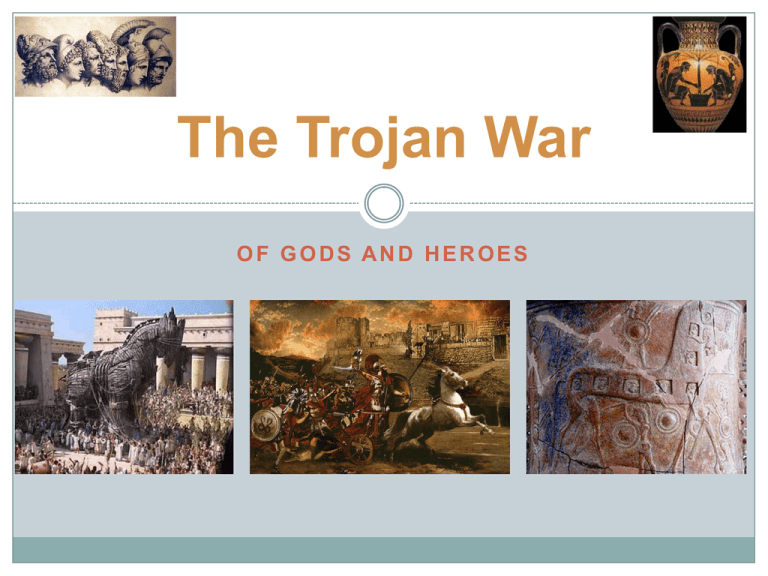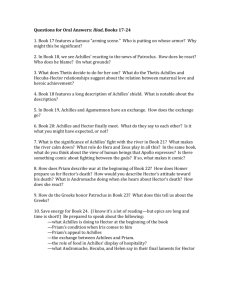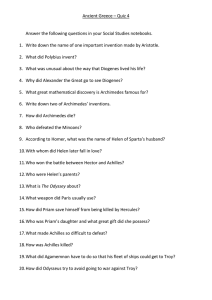The Trojan War - PRELIM Ancient History
advertisement

The Trojan War OF GODS AND HEROES Homer and the Epic Cycle The myth of the Trojan War was a great and continuing inspiration to Greek artists and poets. The main lines of the story were sketched out by early epic poets such as Homer (eighth century BC), but the tradition was never firmly fixed. Later poets treated the myth freely; small incidents were enlarged, new episodes were introduced, local variants incorporated and different (even contradictory) interpretations offered. The Wedding of Peleus and Thetis The Judgment of Paris Eris, the goddess of Discord, was angry that she had not been invited to the wedding of Peleus and Thetis and so she threw among the guests a golden apple inscribed with the words 'For the Fairest'. Three goddesses - Hera, the wife of Zeus, Athena, his daughter, and Aphrodite, the goddess of love - immediately claimed the prize. Zeus, wary of making the decision himself, sent the three contenders to Paris, a prince of Troy, temporarily acting as a shepherd. Paris awards the Apple According to tradition each goddess offered Paris a bribe: Hera offered wide empire, Athena military glory and Aphrodite the most beautiful woman in the world. Aphrodite's offer proved irresistible to Paris, who awarded the apple to her. Helen and Paris The goddess Aphrodite, having promised Paris the most beautiful woman in the world, brought him to Greece to seduce Helen, the wife of the Greek king Menelaos. The launching of 1000 ships The sacrifice of Iphigenia Briseis taken from Achilles In his great epic, the Iliad, Homer recounts part of the story of the Trojan War. He begins in the tenth year of the war and tells of the anger of Achilles and its dire consequences. Achilles, the son of Peleus and Thetis, was the greatest of the warriors on the Greek side. His anger was aroused when Agamemnon, brother of the aggrieved Menelaos and leader of the Greek forces against Troy, unjustly appropriated Achilles' prize of honour, the slave girl Briseis. Armour for Achilles The Greek army, deprived of Achilles, seemed to be facing imminent disaster, and so Patroklos, Achilles' beloved friend, persuaded Achilles to allow him enter the fight with Achilles' fresh troops. Achilles agreed and lent Patroklos his splendid armour. Though he fought brilliantly, Patroklos was killed by Hector, the Trojan champion, who stripped him of his arms. Achilles, who deeply loved his friend, was overwhelmed with sorrow and rage. He wanted to avenge Patroklos and kill Hector, but he had no armour. He therefore summoned his mother, the seanymph Thetis, and begged her to procure new armour for him from the smith god, Hephaistos. Thetis returns Achilles fights Hector The powerful climax of the Iliad comes when Achilles finally confronts Hector. Zeus' golden scales have tipped against Hector and so he is doomed; his divine supporter, the god Apollo, is forced reluctantly to leave him. Athena, meanwhile, has given more than moral support to Achilles and has actually retrieved his spear for him. Re-armed, Achilles spies a chink in Hector's armour and fatally wounds him. Achilles slays Penthesilea The Iliad closes with the return of Hector's corpse to his father Priam, king of Troy, and the Trojans' lamentation over the body of their champion. However, the Trojans were cheered soon afterwards when Penthesilea, queen of the Amazons, brought her brave warrior women to fight on the side of the city. After wreaking much havoc among the Greeks, Penthesilea came face to face with Achilles. Here she met her match. Death of Achilles Paris was desperate to avenge his brother's murder. He managed to fire an arrow into the one area of weakness that Achilles had - in the heel of his foot. Achilles was killed just as his mother had foreseen. However, Paris himself died in battle soon after. The Trojan Horse The war had now gone on for ten years. To win, the Greeks knew they had to somehow get their troops inside the city of Troy. They came up with a clever plan. They made a huge hollow wooden horse, filled it with their best warriors and left it outside the city, then they pretended to sail away. Thinking it would bring them luck, the Trojans brought the horse inside. After nightfall, the Greeks hidden in the horse sneaked out and opened the gates to the rest of the army. The Sack of Troy When the Greeks got inside the city, they began killing people wildly. To make sure that none of Hector's family lived to avenge his death, they even killed his old father Priam, the king of Troy, and his baby son Astyanax. The death of Priam and Astyanax Despite the bravery of the Trojans and their allies, Troy finally fell to the Greeks after ten years of siege. The cruel sack of the city brought suffering to many people, but most of all to the family of gallant Hector. The Greeks were reluctant to let his baby son Astyanax live for fear that he would avenge his father. Thus Astyanax was thrown to his death from the walls of Troy. Hector's father, Priam, the long-suffering king of Troy, also met his death in the sack of the city, dragged away from the altar at which he had sought sanctuary or actually killed upon it, as goes the story told by the poets. The death blow Menelaos and Helen Helen's elopement with the Trojan prince Paris was the prime cause of the War and consequent loss of many lives. Menelaos resolved to make Helen pay for this crime with her life. However, when he came face-toface with her, he was so smitten by her beauty that his resolve melted away. The sacrifice of Polyxena The horrors of war continued even after the fall of Troy and the recapture of Helen. Achilles had died before the city was taken, but his spirit appeared to the Greeks as they were about to depart for home and demanded compensation for all the hard fighting he had done, in the form of the blood of Priam's virgin daughter Polyxena. One returned and another founded Rome Murder of Agamemnon and the flight of Aeneas.




